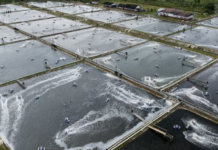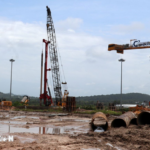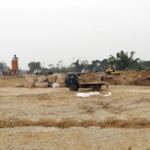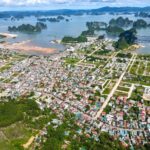The Department of Construction of Ho Chi Minh City (HCMC) has issued a document to relevant departments and local authorities regarding the comprehensive plan for the implementation of the investment project to construct the HCMC Ring Road 4.
Project Boundaries to Be Handed Over by October 2025
According to the Department of Construction, based on Resolution No. 220 of the National Assembly on the investment policy for the HCMC Ring Road 4 project, the HCMC People’s Committee is assigned as the lead agency responsible for the project’s execution.
The Department of Construction is tasked with developing the implementation plan for the project’s components.
 |
The Department of Construction has developed a comprehensive plan for the project, divided into two groups: components implemented through public investment and those executed through public-private partnerships.
The Department of Construction has shared the draft comprehensive plan with relevant units and requested their feedback to finalize the plan before submitting it to the HCMC People’s Committee and the People’s Committees of Dong Nai and Tay Ninh provinces for approval. Given the project’s urgency, the Department of Construction urges all units to provide their input by September 25.
The project timeline is as follows: Land clearance boundary demarcation, planning adjustments, and approvals are scheduled for September 2025, with project boundaries to be handed over by October 2025. Adjustments to affected planning schemes will be completed by November 2025.
Groundbreaking in February 2026
For components implemented through public investment: Feasibility studies will be completed by October 2025, with approvals finalized by December 2025.
Compensation, support, and resettlement plans will be approved, and land acquisition decisions will be issued starting January 2026. Land handover will begin in February 2026, with a minimum of 70% of the land cleared by April 2026. Full land handover is expected by the end of 2026. Construction will commence in February 2026, with completion targeted for Q1 2028.
For components implemented through public-private partnerships: Feasibility studies will be completed by October 2025, with approvals finalized by January 2026.
Investor interest surveys will be completed by January 2026, and the investor selection process, including the signing of BOT contracts, will be finalized by June 2026. Detailed design approvals will follow from June to November 2026. Construction will begin on September 2, 2026, with completion expected in Q2 2028. The project will be operational by 2028, and full handover is scheduled for 2029.
The Department of Construction will lead the project’s implementation, coordinating with consultants to deliver pre-feasibility study reports to local authorities.
HCMC will collaborate with provincial authorities to establish unified standards, technical solutions, and design guidelines for the entire project, ensuring consistency, quality, and aesthetics.
HCMC will report project progress to the Ministry of Construction for consolidation and submission to the National Assembly, the Government, and the State Steering Committee for key national projects to address any challenges promptly.
The People’s Committees of HCMC, Dong Nai, and Tay Ninh will oversee the implementation of their respective components, applying special mechanisms and adhering to relevant legal frameworks.
|
Establishment of the Ring Road 4 Steering Committee To ensure the project’s overall timeline, HCMC has requested provincial authorities to establish a Steering Committee and Expert Group for the entire Ring Road 4 project. Additionally, local governments are urged to allocate sufficient budget funds to meet the implementation schedule of their components. Provinces should review and adjust planning schemes and land-use plans affected by the project, ensuring timely approvals for land acquisition. They should also assess resettlement needs and develop resettlement plans to support land clearance efforts. |
ĐÀO TRANG
– 9:25 PM, September 22, 2025
Vietnam’s First Two Nuclear Power Projects Face Challenges as Khanh Hoa Province Proposes Special Policies
The Standing Committee on Science, Technology, and Environment oversees the implementation of special investment mechanisms and policies for the development of nuclear power projects.
Quảng Ninh Accelerates Land Clearance to Pave the Way for HDMon’s $1 Billion Mega Project in Vân Đồn Special Economic Zone
Amidst the accelerated land clearance efforts for projects in the Vân Đồn Special Economic Zone, the Monbay Vân Đồn project stands out with its nearly $1 billion investment.













































